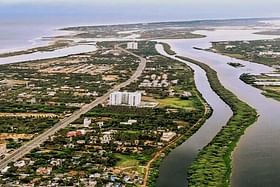The ECR upgrade will help the state socio-economically by stimulating foreign trade and industrial production along the southern coast, as the road connects the main port cities of Chennai and Thoothukudi.
The National Highways Authority of India (NHAI) is evaluating various alternatives and design features for widening the East Coast Road (ECR) near Odiyur lake.
The picturesque ECR is an important road corridor in Tamil Nadu which connects Chennai with Cuddalore through Puducherry. The road was formed in 1998 by interlinking and improving a series of small village roads that were connecting the fishing villages along the coast of the Bay of Bengal.
The construction cost of the ECR expansion project (two-lane to four-lane road) on Mamallapuram and Puducherry stretch is expected to cost Rs 135 crore. The land acquisition cost is estimated to be around Rs 500 crore.
The widening work was put on hold by the National Green Tribunal (NGT), after a petitioner claimed that greenery was being removed from the coastal regulation zone area for the widening work.
The tribunal directed the Tamil Nadu State Coastal Zone Management Authority and the NHAI to consider alternative methods that do not affect ecologically sensitive areas.
Subsequently, the NHAI on 10 April told the Tribunal that the reconsideration of the widening work near Odiyur lake would involve study on geometrics, additional land requirement, delay in time, and amending the scope of the contract already awarded, reports The Hindu.
The NHAI has sought three months’ time, and the matter has been adjourned to 17 July, for reporting further status.
The NGT had previously briefly barred NHAI from moving forward with the road widening project in the contested area.
It is because Odiyur wetland hosts vast sea-grass meadows and is home to thousands of winter migratory birds and comes under a no-development zone, where road construction work is prohibited.
Long bridges have been planned by NHAI as the road passes through several rivers, backwaters, and extensive stretches of salt pans.
The ECR upgrade will help the state socio-economically by stimulating foreign trade and industrial production along the southern coast, as the road connects the main port cities of Chennai and Thoothukudi.
ECR Connectivity From Mamallapuram To Puducherry
In the previous year, NHAI announced that it will resume work on expanding the 105 km stretch of the ECR between Mahabalipuram and Puducherry, to four lanes.
In a bid to improve the road connectivity to Puducherry, the union government in 2018 proposed to widen the 107-km stretch from Mahabalipuram to Puducherry under the Bharatmala Pariyojana Phase-I (Highways project). The union government also allocated Rs 3,000 crore for the project.
NHAI even prepared a DPR (detailed project report) in 2019 and invited bids for widening the ECR to four-lane in two packages, including a package to a four-lane the 61.4 km stretch between Mahabalipuram and Marakkanam at the cost of Rs 1,209 crore.
However, the expansion project was stalled as there was a huge delay from the state government in handing over the stretch to NHAI for upgradation work.
Despite the state government giving an ‘in-principle approval’ in 2019 for transferring the 61.4 km ECR stretch between Mahabalipuram and Marakkanam to NHAI for widening it into a four-lane, there was no progress on the project.
Tamil Nadu Road Development Company (TNRDC), an entity under state highways that developed ECR between Akkarai and Puducherry, had sought compensation from the state government for settling the bank loans before transferring the road to NHAI.
TNRDC demanded Rs 222 crore compensation for handing over the required land. The organisation also sought further compensation for revenue lost, once the toll plaza on the stretch was handed over to NHAI.
The issue was finally resolved in April 2022, with TNRDC officials confirming the state government had agreed to help them meet the liabilities.


